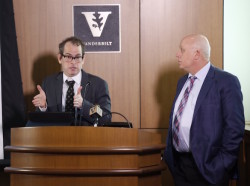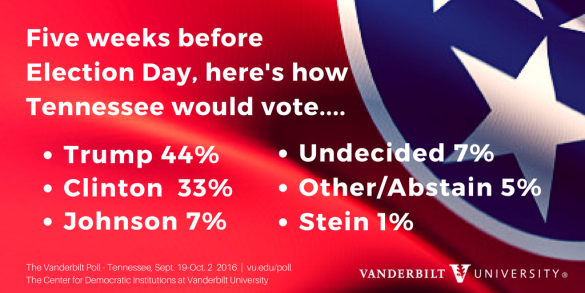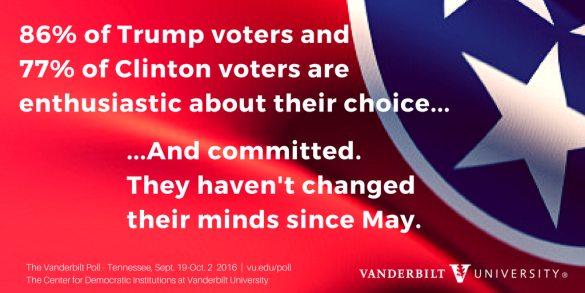Nothing short of “a cataclysmic event” could stop Donald Trump from besting Hillary Clinton come Election Day in Tennessee, according to a new Vanderbilt Poll.
Trump has the support of 44 percent of Tennessee voters and is especially popular with angry voters who want change. Clinton has the support of 33 percent of registered voters and does very well among those voters who are more optimistic about the future of the country. These results come from a poll of 1,000 registered voters in Tennessee.
The poll, conducted Sept. 19 to Oct. 2, has a margin of error of 3.7 percentage points, a margin very similar to the one in the May 2016 Vanderbilt Poll. The first presidential debate, which happened in the middle of this poll, did little to affect the preferences of Tennesseans.
“People are locked in,” said John Geer, Gertrude Conaway Vanderbilt Professor of Political Science at Vanderbilt University and co-director of the Vanderbilt Poll. “They have their preferences and they’re not going to shift them very much, barring a cataclysmic event. Tennessee is going to go Republican. There’s no debate about that.”
Trump has the support of 73 percent of people in the state who described themselves as “angry,” while Clinton did well (66 percent) with people who considered themselves “content.”
“Trump’s supporters are pessimistic at the direction the country is moving,” said Josh Clinton, holder of the Abby and Jon Winkelried Chair at Vanderbilt and co-director of the Vanderbilt Poll. “If you’re a pessimist about the direction of the country, you’re for Trump and for a return to an image of the past.”
Religion
Despite speculation that some of Trump’s statements might alienate religious believers, there is no evidence of this occurring – Trump supporters tend to be more rural and religious than those of Clinton.
“Evangelicals have come home (to the Republican Party),” Geer said. “In fact, all of the partisans have come home (to their political party).”
Backing this up, 82 percent of Democrats back Clinton and the same percentage of Republicans back Trump. Among those who identify with the Tea Party, 73 percent back Trump.
Regional results
Trump outscored Clinton 53 percent to 28 percent in heavily Republican East Tennessee. Clinton and Trump are in a dead heat in urban Nashville (40 percent to Trump’s 38 percent) while Clinton wins the western part of the state dominated by Memphis by a comfortable (46 percent to 28 percent) margin.
Trump’s numbers didn’t change significantly even after what was widely viewed as a subpar performance in the first presidential debate. The release of his tax returns happened just as this poll was completed and so there is no information on whether that news may have shifted things, but the overall stability in his support over time in Tennessee suggests that answer would be “no.”
Reasons for support
Voters were also asked to select one of several reasons for supporting their candidate:
- Has the personality and temperament to serve effectively as president
- Is honest and trustworthy
- Cares about people like you
- Is the kind of person who can bring about much-needed change

“Our hypothesis was that Trump would have high scores for being the candidate who could bring about change,” Geer said.
The data confirm this idea. Seventy-four percent of Trump supporters identified his ability to effect change as the reason for their support. Clinton did best (48 percent) with personality and temperament.
More men than women support Trump, but not enough to make a difference, Geer said. “Even if the electorate could only be women in this state, Trump would still win comfortably,” he said.
Millennials
Millennials displayed their independence in the poll, with 22 percent of voters between 18 and 29 picking independent Gary Johnson as their favorite. Thirty-eight percent of voters in that age range picked Trump, and 28 percent Clinton.
“The younger tend to be more aspirational in their voting behavior,” Clinton said. “[rquote]Being pragmatic does not resonate with younger voters. They want to hear an aspiration for the future rather than detailed policy plans promising incremental change.’”[/rquote]
The Board
The Center for the Study of Democratic Institutions (CSDI) launched the Vanderbilt Poll to provide a non-partisan and scientifically based reading of public opinion within the state of Tennessee and the city of Nashville. The Vanderbilt Poll conducts surveys at least twice a year. In September 2015, the poll carried out its first survey of Nashville. The focus of the polls is to uncover what citizens think about important public policy issues and to make the findings available to citizens, policy-makers and scholars. Since 2011, the Vanderbilt Poll has surveyed more than 17,000 Tennesseans and all poll results are available at www.vu.edu/poll.
The Vanderbilt Poll benefited from the advice from its board of directors on what questions to ask and how the questions were constructed. The current board members are:
- Samar Ali, attorney at Bone McAllester Norton PLLC and co-founder of the Lodestone Advisory Group;
- Charles W. Bone, attorney and chairman of Bone McAllester Norton PLLC;
- José González, instructor of entrepreneurship and management, Belmont University;
- Tom Ingram, political strategist with The Ingram Group;
- Roy M. Neel, senior adviser to former Vice President Al Gore;
- Bill Phillips, government relations consultant and former Nashville deputy mayor;
- Bill Purcell, former Nashville mayor and partner at Farmer Purcell White & Lassiter, PLLC;
- Lisa Quigley, chief of staff for Rep. Jim Cooper;
- Anne Russell, special counsel at Adams and Reese LLP;
- Chip Saltsman, former chief of staff for Rep. Chuck Fleischmann and political strategist;
- and Jamie Woodson, president and CEO of the State Collaborative on Reforming Education (SCORE).

